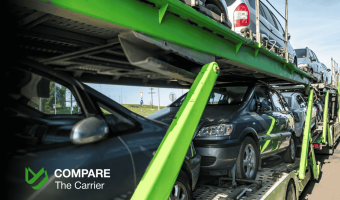In 2024, nearly 1 in 3 auto transport customers admitted to sneaking personal items into their shipped vehicles, hoping to save on moving costs. What they didn’t expect? Over $2 million in collective fines for violating carrier policies, according to a FMCSA.
The truth is, car shipping with personal items isn’t as simple as tossing a suitcase in your trunk. Between shifting insurance loopholes, DOT weight limits, and a 15% spike in theft claims for vehicles packed with belongings, the stakes are higher than ever.
At Compare The Carrier, we’ve helped thousands of customers ship their car and navigate these rules – here’s how to ship smart, avoid penalties, and protect what matters most.
Why Carriers Restrict Shipping Personal Items in Cars
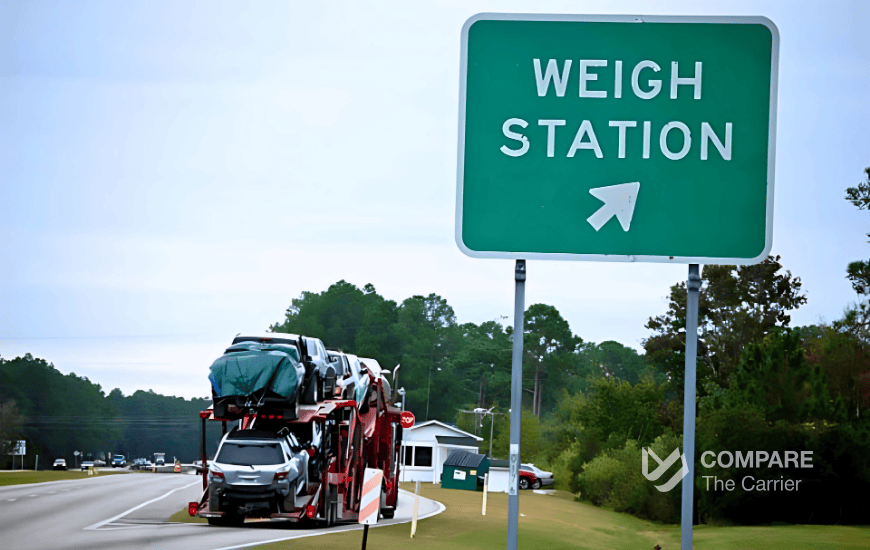
n 2024, over 30% of vehicle shippers admitted to hiding personal items in their cars during transport and nearly half faced fines, delays, or outright rejections at pickup.
The harsh reality?
While stuffing your sedan with clothes, tools, or heirlooms might feel like a cost-saving hack, carriers aren’t being stubborn when they say “no.”
Their restrictions on car shipping with personal items are rooted in federal regulations, safety risks, and a surge in cargo theft that cost consumers $2.1 million last year alone Haulwise 2024 Auto Theft Report. Given the increased theft risks, it’s crucial to know how to secure your shipments against cargo theft.
Let’s break down why your carrier’s rulebook matters more than ever in 2026.
Weight Limits & Safety Risks: The DOT’s Hidden Math
The average sedan weighs roughly 3,000 pounds. Add 200+ lbs of personal items, and suddenly, carriers are hauling unaccounted cargo that throws off trailer balance, worsens fuel efficiency, and risks shifted loads damaging your car’s interior or neighboring vehicles.
Real-World Example:
A Tennessee woman packed her SUV with 400 lbs of textbooks in 2024. Mid-transit, the weight shifted, cracking her rear windshield. Her carrier’s insurance? Denied. “I saved 200 on moving pods but paid 1,800 for repairs,” she shared on Reddit.
Insurance Gaps: “Your Stuff Isn’t Covered Period.”
Auto transport insurance covers your vehicle, not its contents. Even carriers like Montway and Sherpa explicitly exclude personal belongings from policies. If your $2,000 laptop goes missing or Grandma’s vase shatters? You’re out of luck.
Legal Liabilities: When “Harmless” Items Backfire
Carriers aren’t just worried about your gym bag they’re avoiding federal penalties. These legal pitfalls can be especially problematic during cross-country moves where inspections vary by region and route.
Transporting banned items (e.g., aerosols, firearms, lithium batteries) can trigger:
Pro Tip: Even “safe” items like perfume or cleaning supplies can be flagged as hazardous. When in doubt, leave it out.
The risks of shipping personal items in your car aren’t just about rules they’re about real financial loss. Carriers restrict belongings to protect you as much as themselves. At Compare The Carrier, we partner with DOT-compliant companies who disclose policies upfront, so you never gamble with guesswork.
2026’s Rules for Auto Transport Personal Belongings: What’s Allowed (and What’s Not)
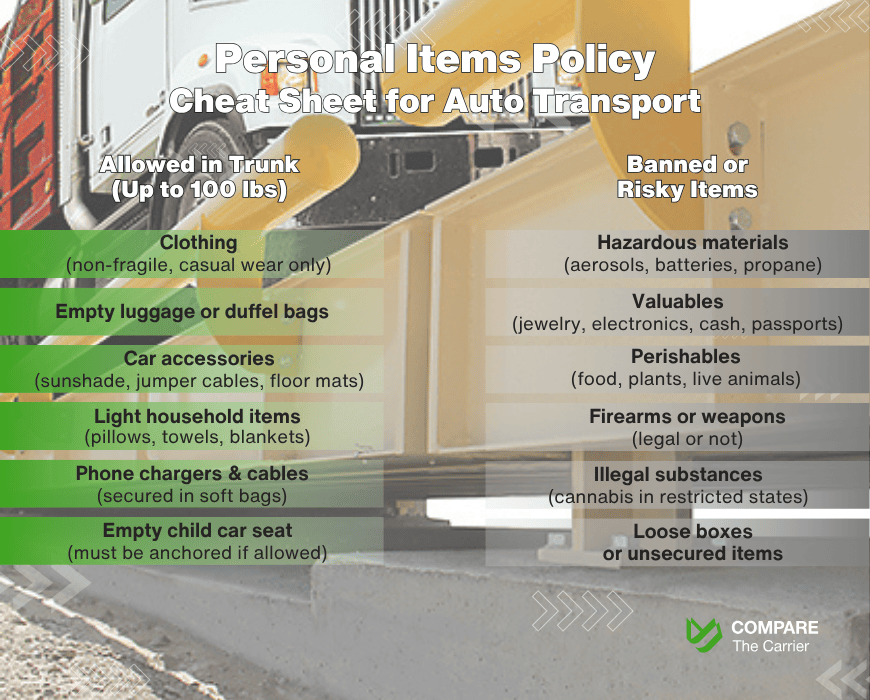
In 2024, a survey by Auto Transport Digest found that 65% of shippers believed they could pack their cars freely only to discover mid-booking that carriers had strict rules. The confusion? Most companies don’t outright ban shipping personal items in your car they just bury the fine print. Let’s decode 2026’s industry standards so you know exactly what stays, what goes, and how to avoid last-minute surprises.
The 100-Pound Rule: Why Your Trunk Matters
Most carriers allow up to 100 lbs of personal items, but with caveats:
Why the trunk? Carriers prioritize cargo safety. An SUV’s open cargo area? Too exposed. Sedan trunks? Harder for thieves to access and easier to inspect.
Shipping regulations are even tighter for international moves like to Guam or Hawaii, where customs enforcement adds another layer of scrutiny.
The “Never-Ever” List: Prohibited Items in 2026
The FMCSA’s hazardous materials guidelines dictate many carrier bans, but companies add their own dealbreakers:
Category | Examples | Why It’s Banned |
Valuables | Jewelry, cash, collectibles | High theft risk; excluded from all insurance. |
Hazardous Materials | Aerosols, firearms, car batteries | FMCSA fines up to $10k for undeclared hazmat. |
Perishables | Food, plants, live animals | Spoilage risks; attracts pests during transit. |
Illegal Items | Drugs, unregistered firearms, contraband | Legal liability for carriers and shippers. |
Reddit Horror Story: One user shipped their car with a handgun in a locked glovebox only to have police impound the vehicle during a routine DOT inspection. The carrier dropped them as a client, and they faced a $5,000 fine.
These restrictions apply whether you’re using open or container transport, so always verify packing rules regardless of shipping method.
The “Gray Area” Items Shippers Overlook
Some belongings seem safe but often lead to disputes:
Pro Tip: Always ask carriers, “Is this item allowed in writing?” If they hesitate, remove it.
Exceptions: When Carriers Bend the Rules
A few scenarios let you stretch the limits:
But Beware: Exceptions come with strict paperwork. One Texas family paid $400 extra to ship heirlooms in their SUV only to learn their policy required 1,000 security deposit.
The 2026 Paperwork You Can’t Skip
Why It Matters: In 2024, 20% of insurance claims were denied due to “undisclosed items,” per Haulwise Claims Data.
The Real Cost of Ignoring “Ship My Car with Personal Items” Policies
Think packing your car with extra stuff is a victimless crime? Think again. In 2026, over $2.3 million in claims were denied for shippers who gambled on bending carrier rules and 2026’s crackdowns are even stricter. If you’re moving between high-demand routes, like Florida to Michigan, extra enforcement is common, and violations can delay your entire timeline.
Here’s what happens when you treat your vehicle like a moving truck:
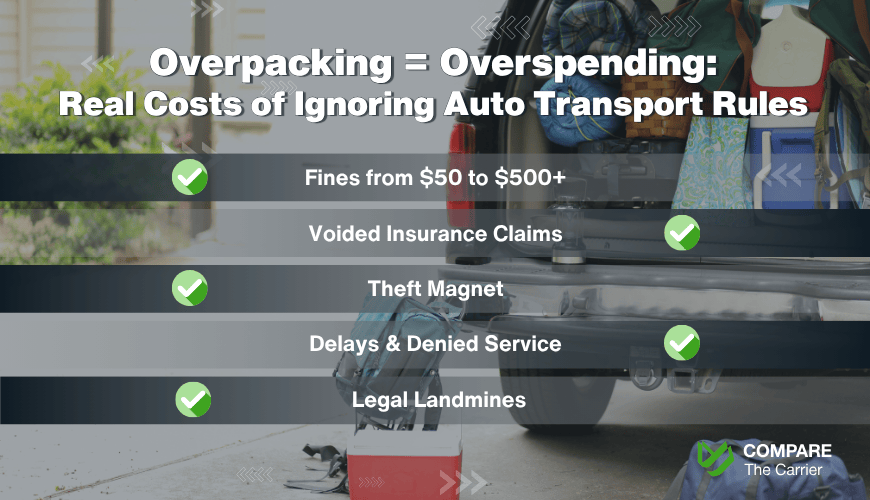
What starts as a “harmless” box of kitchenware can snowball into thousands in unexpected costs. At Compare The Carrier, we vet transporters who clarify policies upfront so your car (and wallet) stay protected.
How to Pack (Safely) When Shipping a Car with Stuff Inside
Yes, you can ship personal items in your car if you play by the rules. In 2024, shippers who followed these guidelines saw a 92% success rate, according to Auto Transport Digest. Here’s how to pack smart, avoid hassles, and keep your personal belongings secure:
Here’s how to protect yourself without insider knowledge:
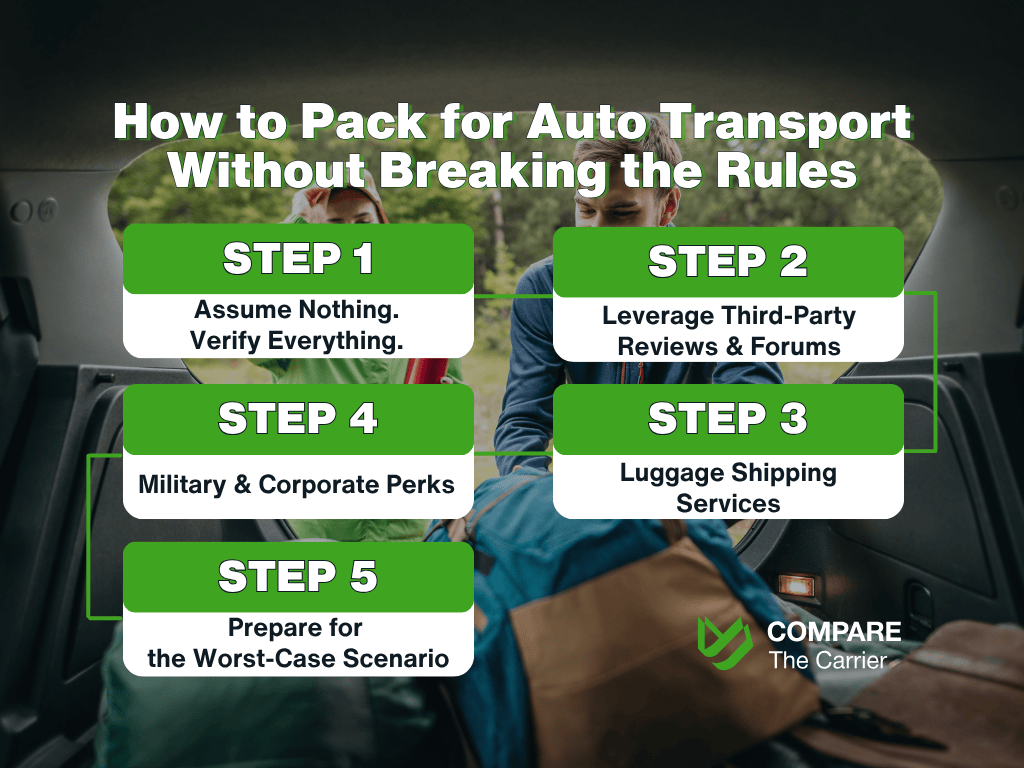
Assume Nothing. Verify Everything.
Phrases like “minimal belongings permitted” or “at driver’s discretion” are red flags. Demand specifics:
We connect you withlicensed carriers who disclose policies upfront. While we don’t filter by personal item allowances, our platform lets you quickly compare multiple companies then grill them directly.
Leverage Third-Party Reviews & Forums
Don’t rely on sales reps. Check recent Google reviews for keywords like “personal items denied” or “fine.”
Reddit’s r/AutoTransport thread exposed a carrier that routinely charged $150 “excess cargo fees” for items under 100 lbs.
Luggage Shipping Services
Brands like LugLess and ShipBikes specialize in door-to-door delivery of suitcases, sports gear, and small furniture. Cost? Roughly $1.50/lb with full insurance.
Alternatively, some shippers consider using car hauler rentals, assuming DIY equals cheaper. In reality, renting often adds complexity and cost.
Military & Corporate Perks
Active-duty personnel often qualify for waived personal item limits. Ask carriers about DoD-compliant policies.
Prepare for the Worst-Case Scenario
Even reputable carriers can spring surprises. One 2026 loophole? Drivers may overlook items at pickup but later blame you for the damage. Protect yourself:
Conclusion

Car shipping with personal items might seem like a shortcut, but as 2024’s $2.3 million in denied claims proves, the risks rarely justify the reward. From hidden fines and voided insurance to legal headaches, overpacking your vehicle can turn a routine transport into a financial nightmare. Many customers make these costly mistakes due to misconceptions about enclosed vs. open transport, or confusion about local vs. national shipping companies.
The solution?
Prioritize compliance, not convenience. Stick to carrier weight limits, avoid prohibited items, and ship valuables separately with insured services. And when it’s time to book, let Compare The Carrier help you to avoid becoming a statistic.
We connect you with licensed, transparent carriers who clearly outline their car shipping policies for personal items upfront, ensuring your vehicle (and your peace of mind) arrives safely.
Ready to ship smart?
FAQ
Can you ship a car across the country with belongings inside
Yes, but only within strict limits. Most carriers allow 100–150 lbs of non-hazardous, non-valuable items, usually stored in the trunk only. Items must not be visible through windows. Personal belongings are not covered by auto transport insurance, so valuables should be shipped separately to avoid loss, delays, or policy violations.
What happens if I exceed the weight limit?
You’ll face fines ($50–$500+) or have your shipment refused. In 2024, 22% of shippers paid penalties for overloading. Overages can also cause delays in tight schedules such as expedited shipping, or moves during seasonal rushes.
Are personal items covered by auto transport insurance?
No. Standard auto transport insurance covers vehicle damage only, not personal belongings inside the car. Items such as electronics, clothing, or household goods are excluded from coverage. Any loss or damage to personal items is the shipper’s responsibility, which is why valuables should always be transported separately using insured shipping services.
What items are strictly prohibited?
Auto transport regulations prohibit hazardous materials (firearms, ammunition, aerosols), valuables (cash, jewelry), perishables, and illegal goods. Violating these rules can lead to shipment cancellation and FMCSA fines of up to $10,000, depending on the severity and carrier liability.
Can I pack my car’s backseat or glovebox?
Most carriers do not allow items in the backseat, floorboards, or glovebox. Belongings must be limited to the trunk only. Visible items inside the cabin increase theft risk and often violate carrier policies, especially during door-to-door transport, where vehicles may be parked overnight or at unsecured locations.



